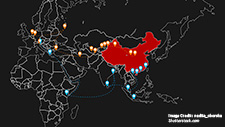Azerbaijan Since Independence
Svante E. Cornell
Azerbaijan Since Independence offers a comprehensive introduction to modern Azerbaijan, a post-Soviet republic located on the western shore of the Caspian Sea. This small country has outsized importance due to its strategic location at the crossroads of Europe and Asia, its energy wealth, and its historical experience as an early modernizer in the Muslim world.
The book begins with six chapters on Azerbaijan’s history from pre-Soviet times to the present, with an emphasis on the past twenty years. The next four chapters are thematic, covering the conflict over Karabakh, the political system, the oil-dominated economy, and societal changes and trends including the role of Islam. The remainder of the book surveys Azerbaijan’s foreign relations, with an analysis of the foreign-policy-making context complemented by chapters on relations with Iran, Russia, Turkey, and the West. The book closes with a brief epilogue discussing the country’s future.
Related Publications
-
ISDP Annual Report 2023
ISDP’s Annual Report for the year 2023. We look back on 2023, a year in which tensions and conflicts captured the strategic space in ISDP’s focus areas, making headlines around […]
-
China in Eurasia: Revisiting BRI amidst the Russia-Ukraine Crisis
This paper discusses China’s trade and connectivity plans under the Belt and Road Initiative (BRI) in the Eurasian region and the impact of the Russian invasion of Ukraine on Chinese […]

